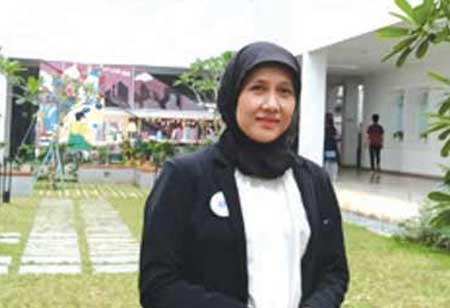

I agree We use cookies on this website to enhance your user experience. By clicking any link on this page you are giving your consent for us to set cookies. More info
Thank you for Subscribing to Business Management Review Weekly Brief

Dewi Fitriyati is the Business Development Head at PT. KATOLEC INDONESIA. Dewi is a results-oriented professional who focuses on identifying and capitalizing on growth opportunities, forging strategic partnerships, and driving revenue growth. Her responsibilities encompass market analysis, lead generation, relationship management, sales strategy development, and negotiation. Dewi collaborates closely with marketing, sales, and product teams to expand market reach and enhance profitability. Her success in this role is driven by strong communication, analytical, and networking skills.
Through this article, Dewi Fitriyati shares key principles and strategies for success in business development, emphasizing the importance of relationships, adaptability, customer focus, and sustainability in navigating a rapidly changing market landscape.
Core Principles & Pivotal Moments: Guiding Business Development Success
Several core principles have guided my career. Building genuine, long-term relationships is paramount, driving sustainable growth far more effectively than short-term wins. A value-driven approach is essential; the focus should always be on how your product or service solves a client’s problem, not just making a sale.
Data-backed decision-making and using market research, customer insights, and performance metrics to refine strategies are crucial. The evolving business landscape demands adaptability and continuous learning to stay relevant and agile. Resilience and persistence are vital, as not every opportunity converts, and learning from rejections refines your approach. Negotiations should always strive for win-win outcomes, creating value for both parties and ensuring lasting partnerships. Finally, strategic networking, expanding your professional circle, increases access to opportunities, insights, and collaborations.
Building Genuine, Long Term Relationships Is Paramount, Driving Sustainable Growth Far More Effectively Than Short-Term Wins
Pivotal moments often involve closing a first significant deal after setbacks and realizing the power of persistence and value alignment. Equally, a failed venture can be defined as providing invaluable lessons about due diligence, market timing, and a customer-centric approach.
Driving Business Growth: Leadership in Competitive Markets
Successful leaders use strategic vision, adaptability, and people-focused leadership in competitive markets. Effective strategies include a clear, compelling vision to provide direction and motivate teams. A customer-centric strategy fosters loyalty, prioritizing customer needs and building strong relationships. Data-driven decision-making, using analytics to inform strategy and optimize performance, is essential.
Agility and adaptability, responding quickly to market changes and embracing innovation are crucial. Building strong relationships and partnerships expands reach and resources. A high-performance team culture, empowering employees and fostering collaboration, drives productivity and innovation. Strategic risk-taking and experimentation are necessary for discovering new opportunities. Operational efficiency and scalability ensure sustainable growth.
Staying Ahead: Anticipating Market and Tech Shifts
Staying ahead of market and tech shifts requires a proactive and adaptable approach. It is vital to combine continuous market research and competitive analysis with data-driven insights and predictive analytics.
Active engagement in industry networks and thought leadership discussions, coupled with fostering internal innovation, provides a strong foundation. Investing in continuous learning and upskilling, alongside collaborating with startups and the tech ecosystem, ensures access to emerging technologies and talent. Adopting agile business models and monitoring regulatory and economic changes allows rapid adaptation. Research, innovation, and collaboration are key to maintaining a competitive edge.
Sustainability in Electronics: Integrating Practices into Strategy
Integrating sustainability into electronics manufacturing requires balancing profitability, environmental responsibility, and long term innovation. Effective strategies include sustainable product design and development, greener supply chains and procurement, and energy efficiency in manufacturing. Implementing robust EPR and recycling programs is crucial. Achieving sustainability certifications demonstrates commitment. Exploring sustainable business models and embracing circular economy principles strengthens the approach. Educating stakeholders and marketing sustainability builds awareness. Partnering with sustainability-focused organizations amplifies impact.
Evolving Consumer Preferences: Preparing for the Next Five Years
Consumer behavior evolves rapidly due to technology, environmental concerns, and changing lifestyles. Key trends include a strong emphasis on sustainability and ethical consumption, with a demand for eco-friendly and ethically sourced products. Personalization and AI-driven experiences will be crucial, with consumers expecting hyper-personalized interactions. Digital and omnichannel experiences are essential, with seamless online and offline integration. A focus on health and wellness will see consumers prioritizing well-being. Subscription and ownership alternatives will gain popularity.
Companies are investing in R&D to meet these demands for sustainable, tech-driven, and wellness focused products. They are enhancing data capabilities for personalized experiences and expanding digital transformation for omnichannel engagement. Adopting circular economy models is crucial for sustainability. Partnering with tech and wellness brands allows companies to stay ahead of trends.
Advice for Professionals: Networking, Mentoring, and Staying Competitive
My advice centers on networking, mentoring, and maintaining competitiveness. Effective networking involves participating in industry events, leveraging online platforms, and joining professional organizations. Collaborating on projects and contributing to thought leadership provides valuable opportunities. Mentoring others, whether formal or informal, is a rewarding way to give back. Creating learning opportunities enhances this process.
Staying competitive requires continuous learning and skill development. Embracing innovation and adaptability is essential. Building a personal brand and expanding industry influence further solidifies your position.